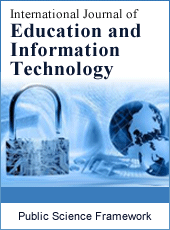International Journal of Education and Information Technology
Articles Information
International Journal of Education and Information Technology, Vol.3, No.3, Sep. 2018, Pub. Date: Aug. 10, 2018
The Studies on Improving the Ability of Mathematical Modeling for University Students
Pages: 46-52 Views: 2091 Downloads: 365
[01]
Lu Liu, The School of Mathematics and Statistics, Shandong Normal University, Jinan, China.
[02]
Zezhong Yang, The School of Mathematics and Statistics, Shandong Normal University, Jinan, China.
Mathematical modeling ability is the capability to apply mathematical knowledge to solve practical problems. With the development of economy and culture, the demand for applied talents is expanding, and the mathematical modeling ability of students is particularly important. In this context, how to cultivate the students’ ability of mathematical modeling to meet the high standards and high requirements of the society has become an important issue in modern modeling education. Many scholars have studied it and have made quite a lot of achievements. This paper intends to analyze and sort out the research results of predecessors, and make comments for future research.
University Students, Mathematics, Modeling, Ability
[01]
Wu, D. Q., C. L. Zhang, C. J. Hou, Z. W. Yang and Q. Wang, 2016. Exploration of ways to build undergraduates' mathematical modeling ability in local agricultural and forestry universities. Education Modernization, (02): 70-72.
[02]
Huang, X. Y. and W. S. Chen, 2014. Investigation and analysis of students' mathematical modeling ability in Higher Education. Institutions University Mathematics, 30 (06): 21-25.
[03]
Liu, S. Q., X. Ma and X. L. Hong, 2015. Constructing consciousness of mathematical modeling and improving college students' application ability in Mathematics. Higher Education Journal, (02): 25+27.
[04]
Xu, J. Y. and S. J. Chen, 2008. Cognition and Discussion on mathematical modeling ability of college students. Science and Education Wenhui (next 10), (11): 109-110.
[05]
Zhang, L. L., 2011. Thinking about the cultivation of mathematical modeling ability for College Students. Information Systems Engineering, (02): 68-69+71.
[06]
Zhang, W., S. Z. Ding and X. D. Fan, 2017. The cultivation and practice of College Students' mathematical modeling ability under the applied talents mode. Examination Week, (38): 122-123.
[07]
Zhang, H., 2007. Developing mathematical modeling ability and deepening the innovative education of university mathematics teaching. China Science and Technology Information, (24): 313-314.
[08]
Liu, Y. L., 2014. Research on developing students' mathematical modeling ability in professional teaching. Journal of Anhui University of Technology, 31 (04): 116-118.
[09]
Jia, X. L., 2013. How to improve college students' mathematical modeling ability. Journal of Jilin Institute of Education (MID), 29 (06): 58-59.
[10]
Li, S. C. and S. F. Wang, 2011. The basic way to cultivate mathematical modeling ability. Chinese Mathematics Education, (19): 8-12.
[11]
Zhao, J. X., 2004. Strategic research on improving mathematical modeling ability. Journal of Mathematics Education, (03): 50-52.
[12]
Ma, S. H., 2017. Approach to training applied talents based on mathematical modeling. Economic Research Guide, (07): 125-126.
[13]
Xie, H., 2010. Practice and Reflection on Developing College Students' mathematical modeling ability. Guangxi Education, (03): 89-90.
[14]
Tan, Z., 2015. High interest, wide knowledge, broad vision, strong ability in mathematical modeling training mode. Mathematical Modeling and Application, 4 (02): 46-52.
[15]
Zhu, J. Q. and J. S. Gu, 2013. Mathematical modeling ability and the cultivation of College Students' comprehensive quality. University Mathematics, 29 (06): 83-86.
[16]
Chen, R. J. and L. Z. Qin, 2015. Practice and exploration of mathematical modeling in the training of Applied Undergraduate Talents. Journal of Changzhou Institute of Technology, 28 (05): 71-74.
[17]
Song, L. Y., 2016. Ways to cultivate college students' mathematical modeling ability. Journal of Agriculture Science and Technology College, 25 (03): 110-112.
[18]
Dai, X. Q., 2017. College students' mathematical modeling ability differentiation training and modular teaching practice. Education and Teaching Forum, (25): 160-163.
[19]
Zhang, Y. D., 2014. Exploration and practice of College Students' innovative ability in mathematical modeling and training of applied talents. Science and Education Guide (last 10), (06): 65+101.
[20]
Li, L., X. Xiao and K. Z. Jiang, 2012. Developing various forms of mathematical modeling and mathematical experiment teaching to cultivate students' innovative ability. Education and Teaching Forum, (08): 33-34.
[21]
Wei, C. D., X. Z. Zhong and Z. Q. Chen, 2008. Improving teaching methods of mathematical modeling to promote college students' innovative ability to form. Education and Occupation, (32): 131-132.
[22]
Zhang, J. F., Q. Y. Chen and Y. H. Lin, 2017. Practice and Reflection on the construction of innovative practice base for mathematical modeling in local colleges and universities. Modern Education Equipment in China, (19): 14-16.
[23]
Liu, H. and Y. M. Yang, 2012. Reflections on College Students' mathematical modeling education. Examinations Weekly (64): 45.
[24]
Hou, Y. Y. and Y. L. Hou, 2012. Thinking on how to cultivate college students' mathematical modeling ability. Knowledge Economy, (04): 153.
[25]
Li, J. C., K. Peng and G. H. Chen, 2016. Analysis of mathematical modeling and training of local college students' innovative ability and comprehensive quality. Education Modernization, 3 (07): 19-22.
[26]
Hou, S. P., 2015. Evaluation model of College Students' mathematical modeling ability based on hierarchical clustering method. Journal of Lanzhou Institute of Education, 31 (04): 83-85.

ISSN Print: 2381-7410
ISSN Online: 2381-7429
Current Issue:
Vol. 5, Issue 1, March Submit a Manuscript Join Editorial Board Join Reviewer Team
ISSN Online: 2381-7429
Current Issue:
Vol. 5, Issue 1, March Submit a Manuscript Join Editorial Board Join Reviewer Team
| About This Journal |
| All Issues |
| Open Access |
| Indexing |
| Payment Information |
| Author Guidelines |
| Review Process |
| Publication Ethics |
| Editorial Board |
| Peer Reviewers |


